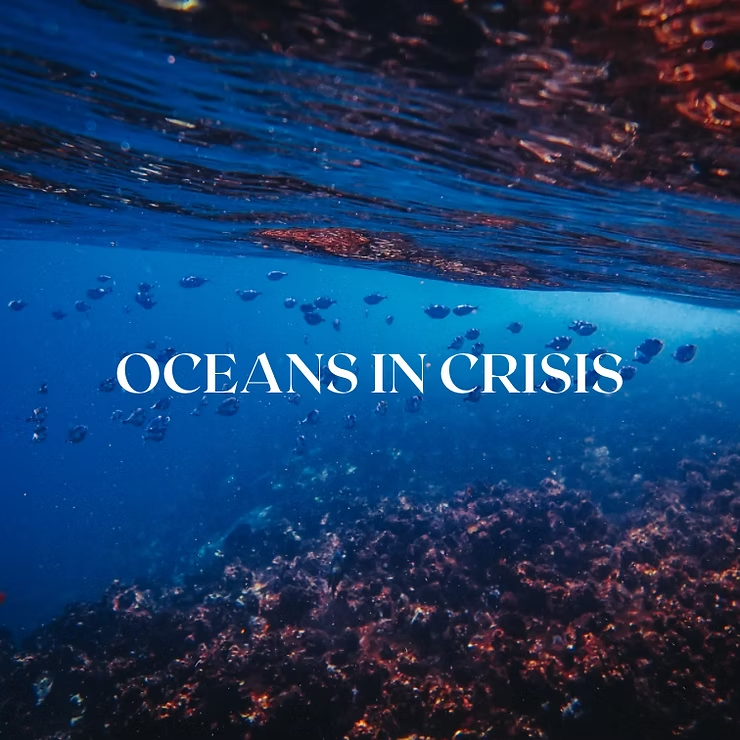Overview
The Importance of Oceans
Oceans cover more than 70% of the Earth and sustain countless ecosystems and species. They provide food, regulate climate, and act as a carbon sink, reducing the impacts of climate change. Often described as the planet’s natural superheroes, oceans shield us from global warming while offering immense beauty and biodiversity. Protecting them is essential for the survival of humanity and all living beings.
Threats to Ocean Health
Despite their importance, oceans are under severe threat from human activities. Overfishing, pollution, and climate change are degrading ecosystems at an alarming pace, leading to biodiversity loss and environmental imbalance.
Current State of the Oceans
Today, oceans face multiple crises. Overfishing disrupts ecosystems, while plastic waste and chemical pollution suffocate marine habitats. Rising sea temperatures and acidification caused by carbon emissions worsen the situation, threatening coral reefs and marine life. Protecting oceans requires immediate steps, such as expanding marine protected areas, reducing waste, and implementing sustainable practices. The future of the oceans rests in our hands.
Impact of Human Activities
Overfishing and Depletion of Marine Life
Overfishing has driven many species to the brink of extinction, destabilizing ecosystems and endangering livelihoods that depend on fishing. Harmful methods like bottom trawling accelerate destruction. Urgent adoption of sustainable practices is critical to reversing these declines.
Pollution and Plastic Waste
Millions of tons of plastic enter the oceans annually, harming wildlife and disrupting food chains. Microplastics are now widespread, entering ecosystems and even human diets. Industrial waste and oil spills add further strain, making stronger regulations and global cooperation indispensable.
Climate Change and Ocean Acidification
Excessive carbon absorption is altering ocean chemistry, reducing pH levels and weakening coral reefs and shellfish. Rising sea temperatures cause coral bleaching, further destabilizing marine biodiversity. Without urgent emission reductions, these changes may become irreversible.
Conservation Efforts
Marine Protected Areas
Marine Protected Areas (MPAs) safeguard biodiversity by giving species space to recover and ecosystems a chance to thrive. They also provide invaluable research opportunities for scientists studying marine life.
Sustainable Fishing Practices
Adopting sustainable fishing ensures balance between consumption and conservation. Measures include setting catch limits, protecting vulnerable species, and supporting local fisheries that use eco-friendly techniques. These practices preserve fish stocks while reducing environmental damage.
Reducing Plastic Pollution
Banning single-use plastics, improving recycling systems, and promoting reusable alternatives are vital in reducing plastic waste. Small steps such as using reusable bags, bottles, and straws collectively make a significant impact in protecting marine life.
Conclusion
Taking Action to Save Our Oceans
Protecting oceans begins with individual action. Choosing sustainable seafood, reducing plastic use, and supporting conservation programs all help secure a healthier marine future.
The Urgency of the Situation
Time is running out. Unless immediate measures are taken, rising threats will irreparably damage vital ecosystems, placing marine life and human well-being at risk. Collective responsibility is the only way forward.
A Collective Responsibility
Every effort matters, from governments enforcing stricter policies to individuals making sustainable choices. Together, we can create lasting change and safeguard our oceans for generations to come.
Save Our Blue Ocean is committed to this mission by raising awareness and inspiring action. Through our collection of ocean-inspired bracelets featuring turtles, sharks, and whales, we encourage support for marine conservation. By choosing a bracelet, you contribute to protecting the oceans and making a positive difference. Visit Save Our Blue Ocean | Ocean Gift Malaysia to explore our collection and join us in preserving our precious marine ecosystems.

